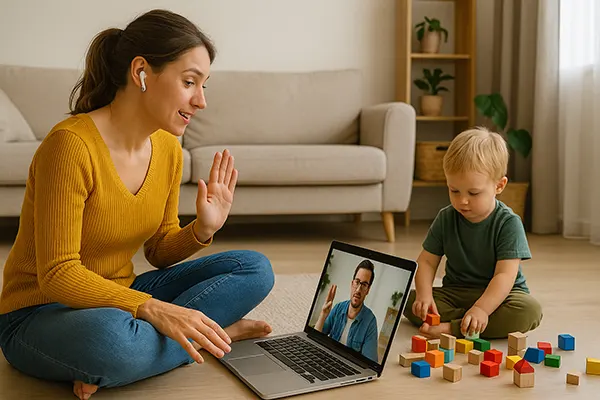
Being a Digital Nomad with a Child: How to Travel with a Toddler and Keep Your Clients
Travelling the world while maintaining a freelance career is already a delicate balancing act — adding a child into the mix transforms it into an entirely new lifestyle. For digital nomad mothers, the ability to work from anywhere is a gift, but it also brings unique challenges: securing safe housing, accessing childcare, and ensuring medical support, all while meeting client deadlines. In this article, we’ll explore how to travel with a toddler without losing clients, drawing on real-life strategies and up-to-date recommendations for 2025.
Family-Friendly Countries for Digital Nomads
Choosing the right destination is a foundational step for nomadic families. While many countries offer favourable visa policies or affordable living costs, not all are equally supportive of families travelling with small children. As of mid-2025, top-rated destinations for digital nomads with kids include Portugal, Costa Rica, and Japan — each for different reasons.
Portugal continues to rank high due to its safe cities, relaxed atmosphere, and widespread English proficiency. Towns like Lisbon, Porto, and Lagos offer a mix of coworking hubs, international schools, and family-oriented infrastructure. Costa Rica attracts families seeking nature and wellness, with many expat-friendly communities like Nosara and Tamarindo. Japan, while more structured, impresses with its impeccable safety record, clean public facilities, and efficient healthcare.
When selecting a country, always check the latest visa regulations for families and healthcare accessibility. In 2025, several countries have introduced or expanded “digital nomad visas” that allow dependents, including children, to accompany freelancers legally and with access to public services.
Considerations for Long-Term Stays with Children
Staying in one place for at least a few months is often more practical when travelling with a toddler. Short-term travel may be manageable for solo freelancers, but children need stability, social interaction, and time to adapt. Opting for longer stays allows families to build routines and integrate into local life.
Check the availability of local playgroups, expat parenting communities, and language support services. Many digital nomad hubs now include child-friendly coworking spaces or even on-site daycare facilities. These resources make it easier for parents to carve out focused work hours while the child socialises safely.
Countries like Estonia and the Netherlands offer community-driven support for international families, making them attractive bases. Combining safety, affordability, and infrastructure geared towards family life helps reduce the stress of juggling parenting and remote work.
Choosing Accommodation: Prioritising Safety and Accessibility
Accommodation for nomad families goes far beyond fast Wi-Fi. Parents need housing that’s safe, toddler-proof, close to basic services, and ideally located in a quiet area. When travelling with a child, proximity to healthcare and childcare becomes non-negotiable.
Look for furnished apartments in family-oriented neighbourhoods rather than central tourist zones. Platforms like Nomad List and Expatistan are useful for filtering locations based on family-friendliness and safety ratings. In 2025, new rental services have emerged that specialise in matching nomadic families with verified long-term rentals.
In urban areas, consider locations near green spaces, clinics, and public transport. In rural or coastal destinations, ensure internet reliability and emergency access routes. Always confirm the presence of child-safety features, such as secure balconies, stair gates, and accessible emergency contacts.
Accessing Local Services: Nurseries and Clinics
Finding reliable childcare and healthcare abroad requires proactive planning. Many urban centres now offer international nurseries that accept short-term enrolments for digital nomads. When evaluating options, prioritise language support, transparent pricing, and positive parent reviews.
Medical coverage is another critical factor. In 2025, most EU countries offer expat-friendly health insurance plans that cover children’s care. In countries with private healthcare systems, verify that your insurance covers paediatrics and emergency visits. Telemedicine options can also fill gaps while on the road.
Reach out to local expat forums and parent groups for honest recommendations. Whether you’re in Chiang Mai or Valencia, community knowledge is invaluable when locating services that respect international standards and can accommodate nomadic schedules.

Work-Life Balance: Managing Client Expectations
Keeping freelance clients satisfied while caring for a toddler is a major concern for travelling parents. The key lies in setting realistic expectations, creating structure, and maintaining consistent communication. As of 2025, flexible work is not just common — it’s expected. Many clients appreciate transparency over rigid professionalism.
Use shared calendars, regular update emails, and auto-replies to keep communication flowing. Block out realistic work hours based on your child’s sleep or daycare schedule. Avoid over-promising — a missed nap or unexpected illness can throw off even the best-laid plans. Long-term clients will often be more understanding if you remain upfront about your situation.
Project management tools like Notion, Asana, and ClickUp continue to dominate in 2025 and can help maintain transparency even when you’re switching time zones. Integrating these tools into your routine shows clients that your parenting duties don’t compromise your professionalism.
Tips from Experienced Freelance Mothers
Veteran digital nomad mums recommend building a strong support network. Partner with other nomadic parents to exchange babysitting, share resources, or simply decompress over a coffee. Having a trusted network in each location can make the difference between burnout and balance.
Work during early mornings, nap times, or after bedtime to preserve uninterrupted hours. Some parents also opt for part-time nannies or local au pairs, particularly in affordable destinations like Thailand or Georgia. Even a few hours per day can boost productivity and help reclaim personal space.
Finally, don’t underestimate the value of slow travel. Instead of ticking off destinations, prioritise quality time and manageable routines. Children thrive on consistency, and your freelance work will benefit from fewer distractions and deeper focus.




